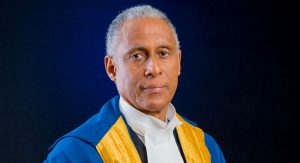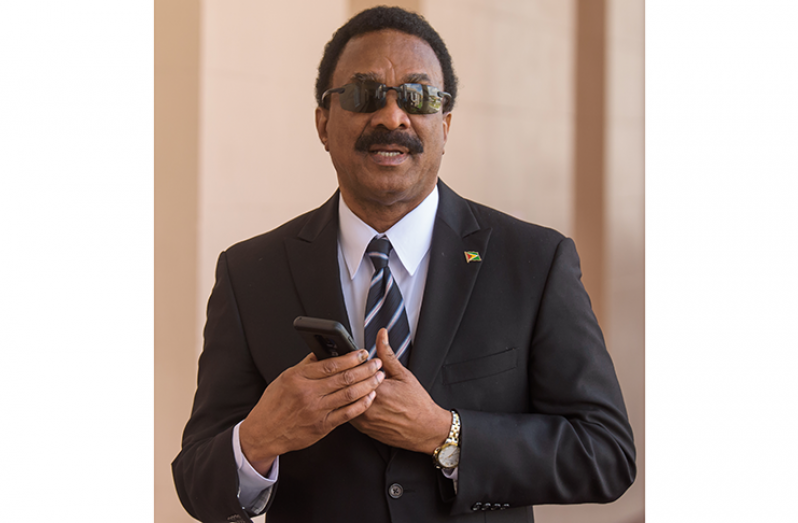…gov’t tells court in proposal for consequential orders
…says CCJ role should be quite limited
…proposes that House extends time for elections
ATTORNEY General (AG) Basil Williams, in his submission for the Consequential Orders that should stem from validation of the no-confidence motion, invited the Caribbean Court of Justice (CCJ) to order that the President set a date for elections after consultation with the Guyana Elections Commission (GECOM), and until such elections are held, the government, inclusive of the President and Cabinet, remains in office.
He, however, made it clear that the court has no jurisdiction to set the date for General and Regional Elections or to dissolve Parliament. Such powers are vested only in the President of the Cooperative Republic of Guyana.
On June 18, the CCJ upheld a no-confidence motion against the government, triggering the need for early elections in accordance with Article 106 (6) and (7) of the Constitution. Since that landmark ruling, the CCJ invited the parties in the consolidated case to make submissions for consequential orders that should follow the ruling.
The AG filed his submissions on the post-judgment relief with the CCJ on July 1, 2019. In the court document seen by the Guyana Chronicle on Saturday, the attorney general told the CCJ that the appropriate Consequential Orders should be quite limited. Before making submissions on appropriate relief, the AG said it was apposite to describe what would be inappropriate relief.
It was on that note that Williams respectfully submitted to the CCJ that it has no jurisdiction to set the date for elections or to dissolve parliament, maintaining that only the President has that exclusive right.

“Before setting a date for elections, this court must ask and answer the following question: What is the best date for general and regional elections to be held in Guyana? Frankly, that question and the answer to it are political in nature and within the exclusive right and privilege of the President of Guyana. The courts of Guyana do not answer political questions. In like vein, it falls exclusively to the President to decide when to dissolve Parliament,” the AG submitted.
He took note of the fact that Article 106 does not provide for dissolution of the National Assembly in the event that a government is defeated on a motion of confidence. “It follows that notwithstanding such a defeat, the power of dissolution remains constitutionally vested with the President. There is no evidence before this court that proves or suggests that the President will fail to discharge his constitutional duty,” he said.
Urging the court to stay above politics, the attorney general, in his submissions, reminded the court that the legal dispute over the validity of the motion has been settled, and it is not for the court to provide the political solution that the Leader of the Opposition desires.
He submitted that the reality of the situation is simple. “The motion has been validly passed and elections must be held; elections can only be lawfully held if they are credible, which requires the completion of the Official List of Electors by way of house-to-house visits; it is for the President, after consultation with GECOM, to determine when elections can be lawfully held; the President should seek an extension of the period for the holding of elections from the National Assembly; and in any event, in light of the government’s defeat through the motion, the President and GECOM must take steps to hold the elections as soon as possible,” the attorney general laid out.
He maintained that it is for the Opposition Leader to return to the Parliament to extend the period for the holding elections in accordance with the Constitution. “If, for whatever reason, Parliament does not discharge its constitutional function pursuant to Article 106 (7), then as this Court has found that the Government has lost the confidence of the National Assembly, it would fall to the President, as supreme executive authority, to resolve the constitutional imbroglio. After consultation with a duly constituted GECOM, he would dissolve Parliament and set a date for elections,” Williams reasoned.
On those grounds, the AG said it would be appropriate for the court to order that in the event the National Assembly does not pass a resolution to extend the period for the holding of elections, the President after consultation with GECOM, shall dissolve the National Assembly and fix a date for elections in accordance with Articles 70 (2) and 61 of the Constitution.
Until those elections are held and a president is sworn in, the government, including the President, prime minister, ministers and Cabinet shall remain in office, the attorney general submitted. It was noted that while Article 106 (6) indicated that Cabinet including the President must resign if a government is defeated on a vote of confidence, it is silent on when the resignation should take place. According to the AG, Article 106 (7) details the intent of the framers of the Constitution. That article explains that notwithstanding its defeat, government must remain in office and resign after the President takes the oath of office following the election.
The AG, Belizean Senior Counsel Eamon Courtenay and Solicitor-General Nigel Hawke are among signatories to the document. Anil Nandlall, the attorney representing the Leader of the Opposition Bharrat Jagdeo, also made submissions on the orders that should be granted along with other attorneys in the case.
On Friday, July 12, 2019, the CCJ is expected to make consequential orders based on the submissions made in the consolidated case on the no-confidence motion.












